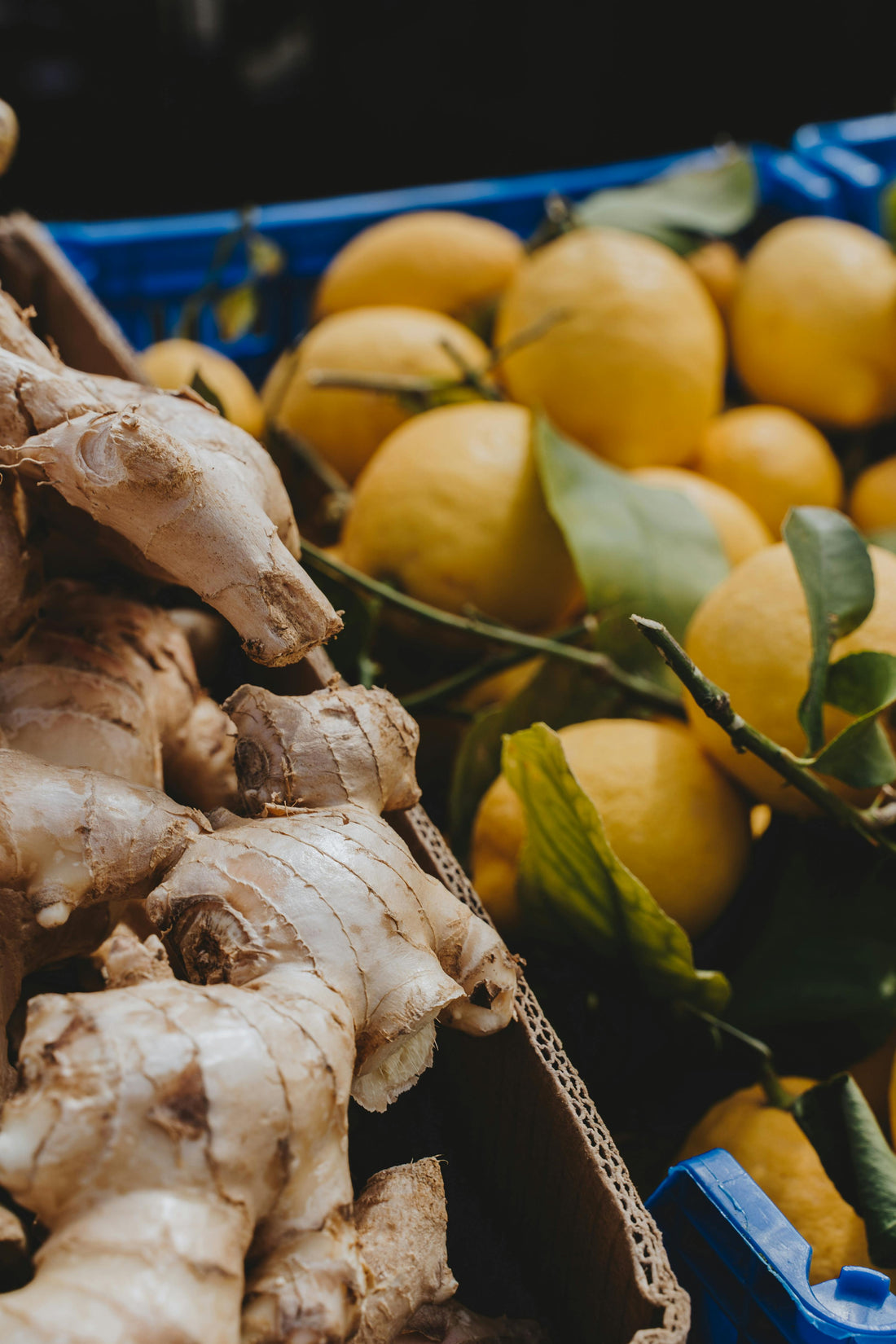
How to Make Ginger Tea
Share
How To Make Ginger Tea With Fresh or Dried Ginger
There's something undeniably soothing about a steaming cup of ginger tea. Ginger root can provide relief from congestion, a soothe indigestion, or simply be enjoyed for its flavor. Ginger tea is made from the root of the ginger plant, is renowned for its spicy and earthy taste. In this blog post, we’ll walk you through the step-by-step process of making the perfect ginger tea at home. Grab your favorite mug and let’s get started on bringing this age-old herbal remedy into your kitchen.
So, Can I Just Put Ginger in Hot Water?
Yes, you can! In its simplest form, making ginger tea can be as straightforward as just adding fresh ginger to hot water. However, there are a few tips and tricks to elevate this basic preparation into a more flavorful and beneficial experience.
Slicing or peeling your fresh ginger root before adding it to the water can help to increase the surface area and strength of your infusion. Leaving the peel on your fresh ginger root may cause your infusion to be weaker tasting than it would be otherwise. If you are using dried ginger root, you can skip this part, as most dried ginger root is already cut and peeled for you.
For added depth and health benefits, consider adding a splash of lemon juice, a dollop of honey, or other herbs for extra health benefits. Fresh lemon added to your ginger tea can help to enhance flavor, while fennel seeds can help to further relieve bloating. Elderberries and rosehips are a great option if you want to boost your immune system to fight off a cold.
How Do You Cut Ginger for Tea?
To make a delightful cup of ginger tea, you can use fresh or dried ginger root. If you’re using fresh ginger root, you will need to cut it before brewing your tea.
Start by selecting fresh, firm ginger root. Begin by thoroughly washing the ginger to remove any dirt or impurities. Peel the ginger using a spoon or a vegetable peeler, as this method helps preserve more of the valuable flesh. Once peeled, use a sharp knife to slice the ginger into thin rounds or fine julienne strips. The thinner you cut the ginger, the more surface area is exposed, allowing for a more robust infusion of flavor into your tea.
How to Make Ginger Tea With Fresh or Dried Ginger Root
You can enjoy a fragrant and comforting cup of ginger tea using this method and fresh or dried ginger root. If you’re drinking ginger root tea for its health benefits, you may prefer to use the dried root, as it has a naturally higher concentration of anti-inflammatory shogaols than the fresh ginger root.
Here’s a straightforward step-by-step guide on how to make ginger tea with cut or dried ginger root:
- Boil Water: Begin by boiling 1 cup of water in a kettle or pot.
- Add Ginger Root: To the boiling water, add 1 teaspoon of ginger root. You can adjust the amount based on how strong you want your tea to be; more ginger will yield a spicier flavor.
- Infuse: Remove from heat and let the mixture steep for about 10-15 minutes. This gives enough time for the dried ginger root to release its rich, aromatic oils into the water.
- Strain and Serve: Pour the tea through a fine mesh strainer into your favorite mug, removing the ginger pieces.
- Optional Additions: Enhance your tea with a spoonful of honey or a splash of lemon juice for added flavor.
How to Make Ginger Tea With Ground Ginger
If you're looking to enjoy the benefits of ginger tea but don't have fresh or cut dried ginger on hand, don’t worry! You can still make a healthy tea using ground ginger. We don’t usually recommend making ginger tea with ginger powder because most people don’t find the texture of the tea as pleasant when it’s prepared this way. That being said, if you’re in a pinch, it is possible to make ginger tea with ginger root powder. Here’s a simple guide on how to make it:
- Boil Water: Start by boiling a cup of water in a kettle or pot.
- Add Ground Ginger: To the boiling water, add 1/2 teaspoon of ground ginger. Adjust the amount based on your taste preferences; more ground ginger will yield a stronger and spicier tea.
- Simmer: Reduce the heat and let the mixture simmer for about 5-10 minutes. This allows the ginger to fully infuse its flavor into the water.
- Strain and Serve: Pour the tea through a fine mesh strainer into your favorite mug, removing as much ginger sediment as possible.
- Optional Additions: Add a touch of honey or a squeeze of lemon juice for extra flavor.
How Much Ginger Do I Put in a Cup of Tea?
When making ginger tea, the amount of ginger you use can greatly influence its flavor and potency. For 1 cup of water, you’ll want to use about 1 to 1.5 teaspoons of fresh ginger root, which is roughly equivalent to a piece of ginger about the size of your pinkie finger. If you're using sliced ginger, 3-4 thin slices will usually do the trick. If you’re using dried ginger root to make your tea, use 1 teaspoon of cut dried ginger per cup of water.
Does Boiling Ginger Destroy Its Benefits?
When making ginger tea, a common concern is whether boiling ginger diminishes its health benefits. While it's true that some heat-sensitive compounds in ginger, like certain enzymes and volatile oils, are reduced during boiling, the majority of its health-promoting properties remain intact. Boiling ginger does not destroy all of its benefits and you can still enjoy a comforting cup of ginger tea with its anti-inflammatory, digestive, and immune-boosting properties.
What Is Ginger Tea Good For?
Ginger tea isn't just a soothing beverage; it has numerous health benefits that can enhance your overall well-being. Often celebrated for its anti-inflammatory properties, ginger tea can help alleviate symptoms of arthritis and muscle soreness. It is also well-known for its digestive benefits such as easing nausea and motion sickness and promoting a smoother digestive process. Furthermore, ginger tea can boost your immune system, helping to fend off colds and infections. With its warm and spicy taste, knowing how to make ginger tea can provide you with a versatile remedy for a variety of common ailments.
Does Ginger Increase Stomach Acid?
Yes, ginger naturally stimulates the production of stomach acid, which is why it’s such a popular tea for aiding digestion. Ginger root tea can help your body to break down foods more efficiently and combat digestive issues such as bloating, nausea, and indigestion.
Can Ginger Water or Ginger Tea Reduce Belly Fat?
Many people are curious whether ginger water or ginger tea can reduce belly fat. While it's a popular belief that ginger has fat-burning properties, the truth is slightly nuanced. Ginger itself doesn't directly burn belly fat, but it can certainly support your weight loss efforts in other ways.
One notable benefit of ginger tea is its ability to relieve gas and reduce bloating, making you feel more comfortable and less puffy, and potentially even leading to a slimmer appearance. Improved digestion is another benefit, which can help you to maintain a healthy weight. Aim to combine your ginger root tea with regular exercise and a nutritious diet for the best results.
Is Ginger Good for the Liver and Kidneys?
Many people want to know how ginger root effects the liver and kidneys.
Ginger contains potent anti-inflammatory and antioxidant compounds, such as gingerol, that have been shown to help protect the liver from damage. Regular consumption of ginger tea can help reduce inflammation in the liver and improve its function, and aid in detoxification processes.
Similarly, ginger tea can have positive effects on kidney health. Its diuretic properties can help flush out toxins and may help prevent the formation of kidney stones. Furthermore, ginger has been noted for its ability to lower blood pressure and improve circulation, both of which are crucial for kidney health.
How Many Cups of Ginger Tea a Day Is Ok?
When it comes to enjoying ginger tea, moderation is key. So, how many cups of ginger tea a day is ok? Consuming up to 2-3 cups of ginger tea daily is considered safe for most people. If you have a sensitive stomach or are prone to heartburn, you may prefer to drink fewer cups of ginger tea per day.
Is It Healthy to Drink Ginger Tea Daily?
If you're a fan of spicy teas and have recently learned how to make ginger tea, you might be wondering about the health implications of enjoying this spicy brew daily. For most people, it drinking ginger tea daily is a healthy choice.
Ginger is packed with antioxidants, which help combat oxidative stress and may reduce the risk of chronic diseases. Regular consumption of ginger tea can also bolster your immune system, thanks to its anti-inflammatory and antimicrobial properties. Moreover, ginger is known for its digestive benefits; drinking a cup daily can aid in digestion, alleviate nausea, and prevent bloating. Additionally, ginger tea has been linked to improved cardiovascular health. Compounds like gingerols and shogaols can help lower blood pressure, reduce cholesterol levels, and improve circulation.
When Not to Take Ginger?
While ginger tea boasts numerous benefits, it may not be suitable for everyone. People with sensitive stomachs might struggle to tolerate ginger. Additionally, if you have ulcers, GERD, gallstones, or kidney disease, it’s wise to proceed with caution, as ginger could potentially cause irritation. Those prone to hemorrhaging may wish to avoid ginger due to its blood-thinning effects. Ginger may cause heartburn for some people, and consuming ginger root tea with food can help to prevent potential heartburn. Additionally, ginger can enhance the absorption of some medications, and may temporarily diminishing the uptake of iron and fat-soluble vitamins. It’s always prudent to consult with a healthcare provider to ensure ginger tea is a safe addition to your dietary regimen.
Can Too Much Ginger Tea Be Bad?
Consuming excessive amounts of ginger tea can cause some temporary discomfort, including hot flashes, heartburn, or even affect the absorption of certain medications. However, these effects are generally not severe or long-lasting. Listening to your body can help you determine how much ginger root tea is appropriate for your body.
Related Articles
How Long Does It Take for Burdock Root to Cleanse Blood?
How to Make Catnip Tea 5 Different Ways
References
This blog post has been compiled from reliable sources to ensure the veracity of the mentioned details. Any reference to scientific studies, historical data, or culinary information has been thoroughly cross verified.
- Bode, A. M., & Dong, Z. (2011). The amazing and mighty ginger. Herbal Medicine: Biomolecular and Clinical Aspects. 2nd edition.
- White, B. (2007). Ginger: an overview. American family physician, 75(11), 1689-1691.
